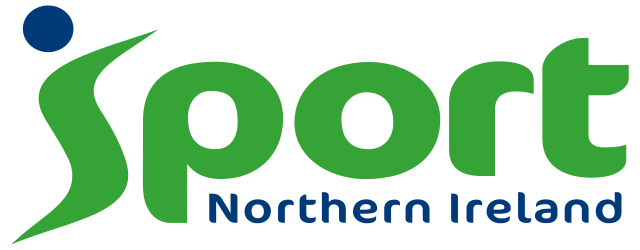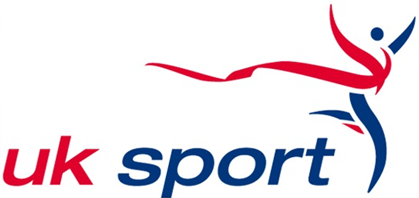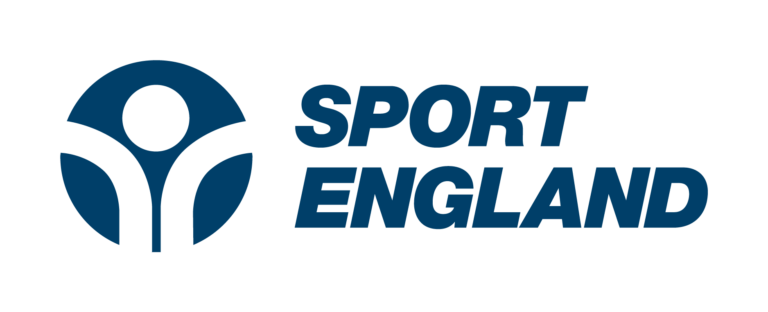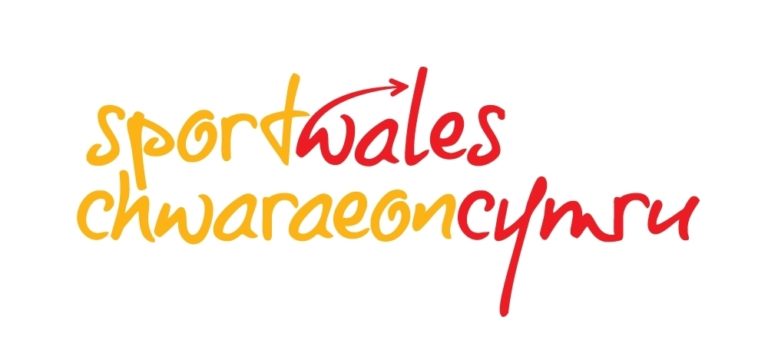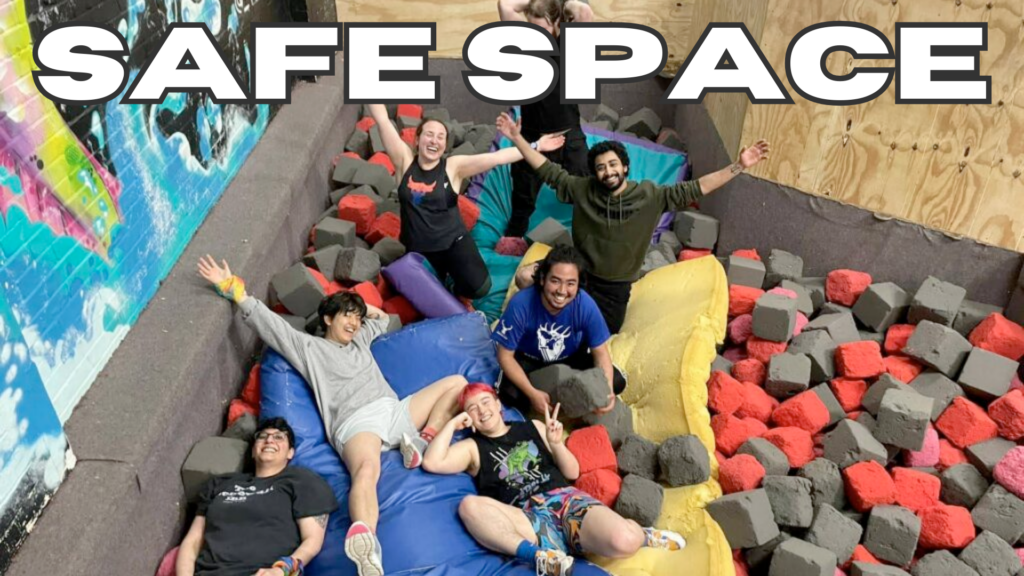
Queer Parkour is a community-focused group, fronted by 4 members of the parkour, art du deplacement, and freerunning community who identify as LGBTQIA+.
Their four leads are dotted across the UK (and the world!), and they’re working to build a community, give a voice, and improve accessibility and experience for the LGBTQIA+ community in Parkour, Art du Deplacement, and Freerunning.
The four individuals who started Queer Parkour are Jia Wei @officialjiawei (he/she/they, Cardiff and team TOFU Parkour, Malaysia), Louiseanne @louiseannewong (she/they, team Esprit Concrete, London), Amy @dallex_ (she/her, Manchester) and Kel @kelglaister (she/her, Melbourne in Motion, Australia).
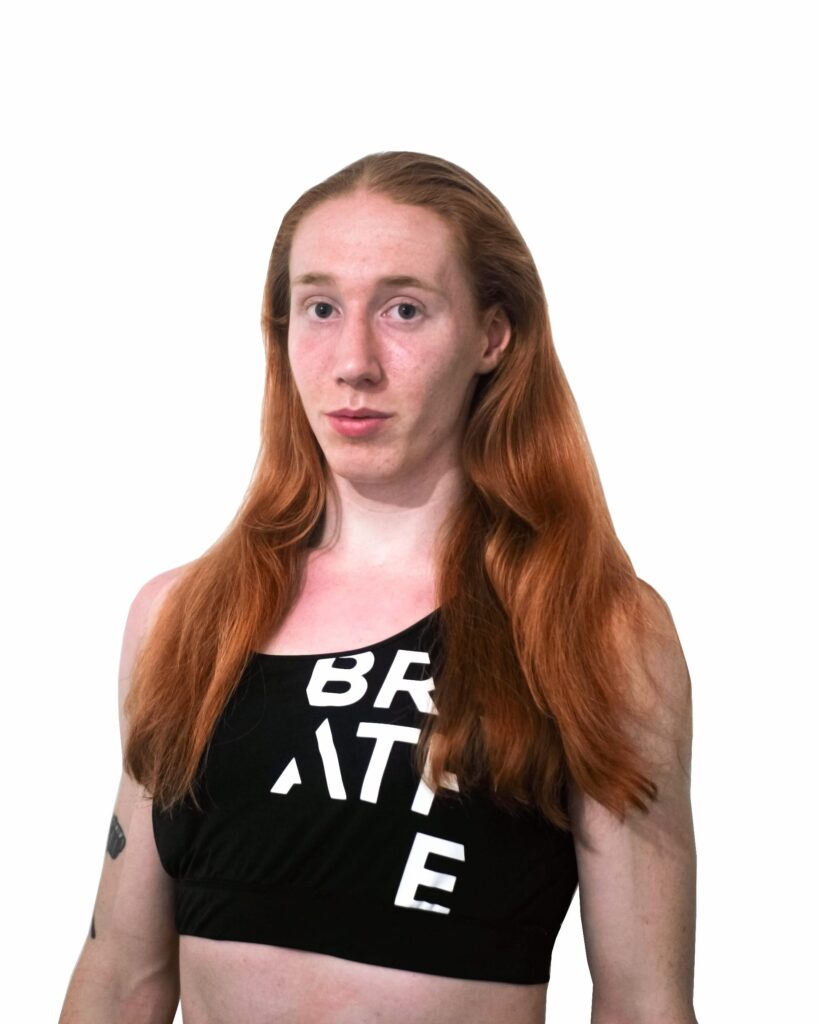
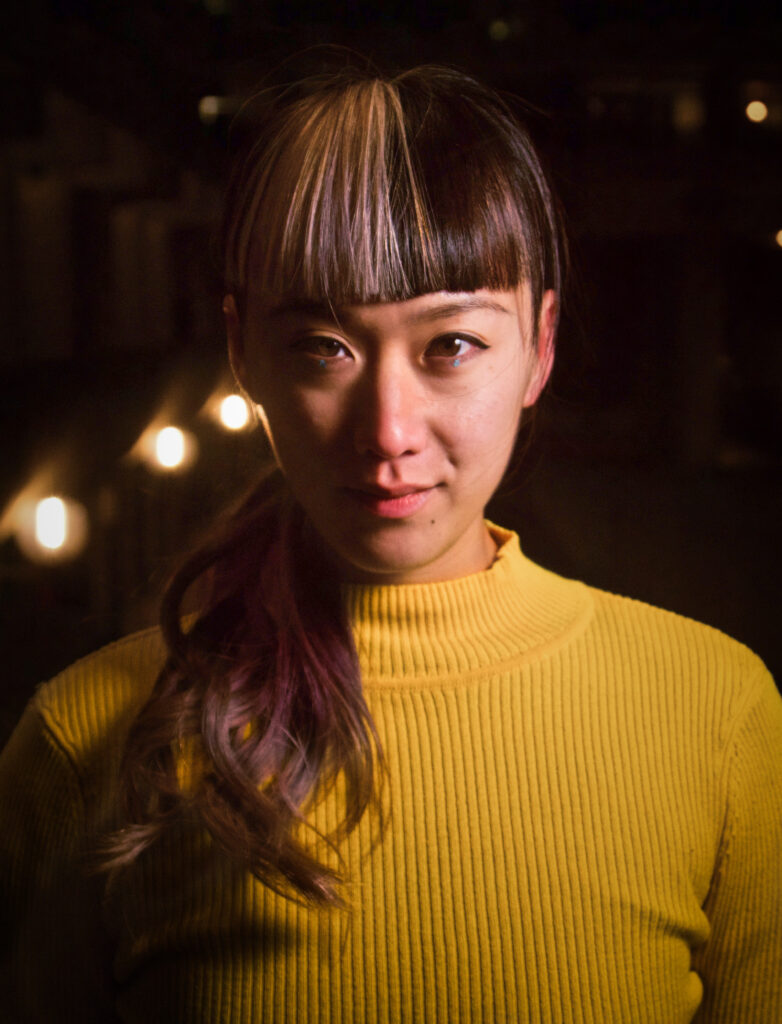
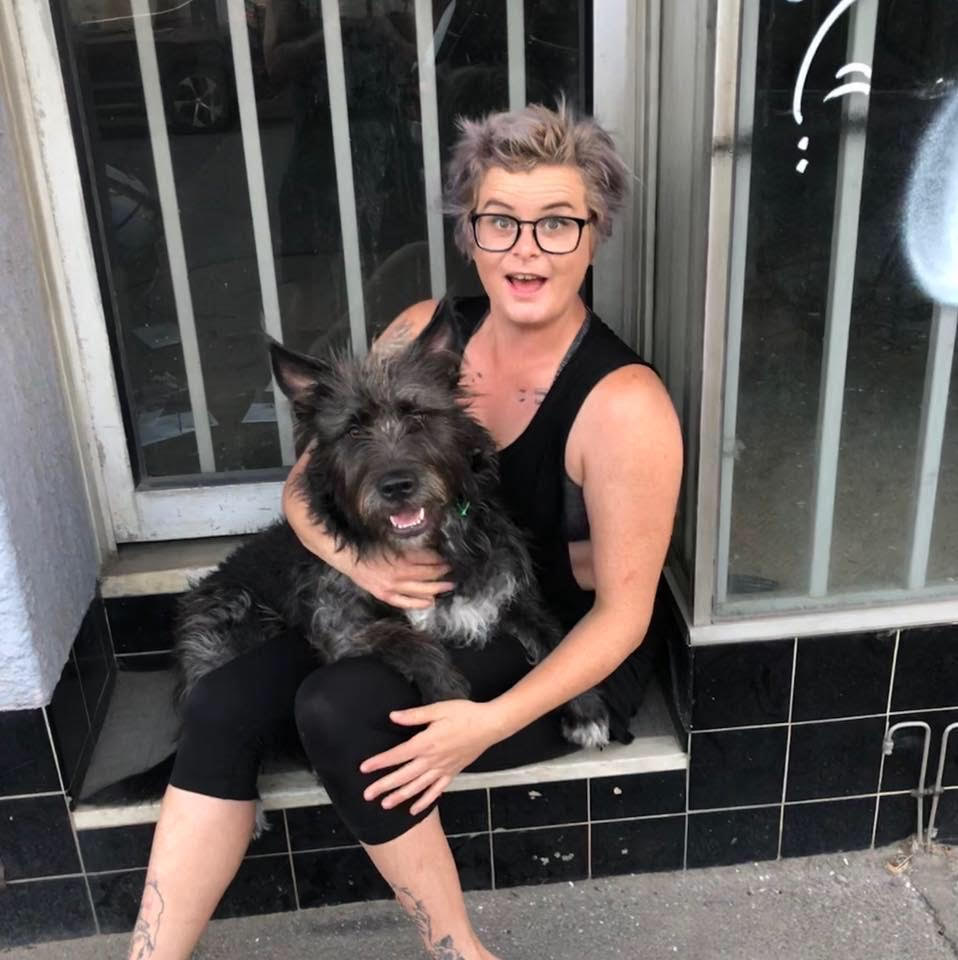
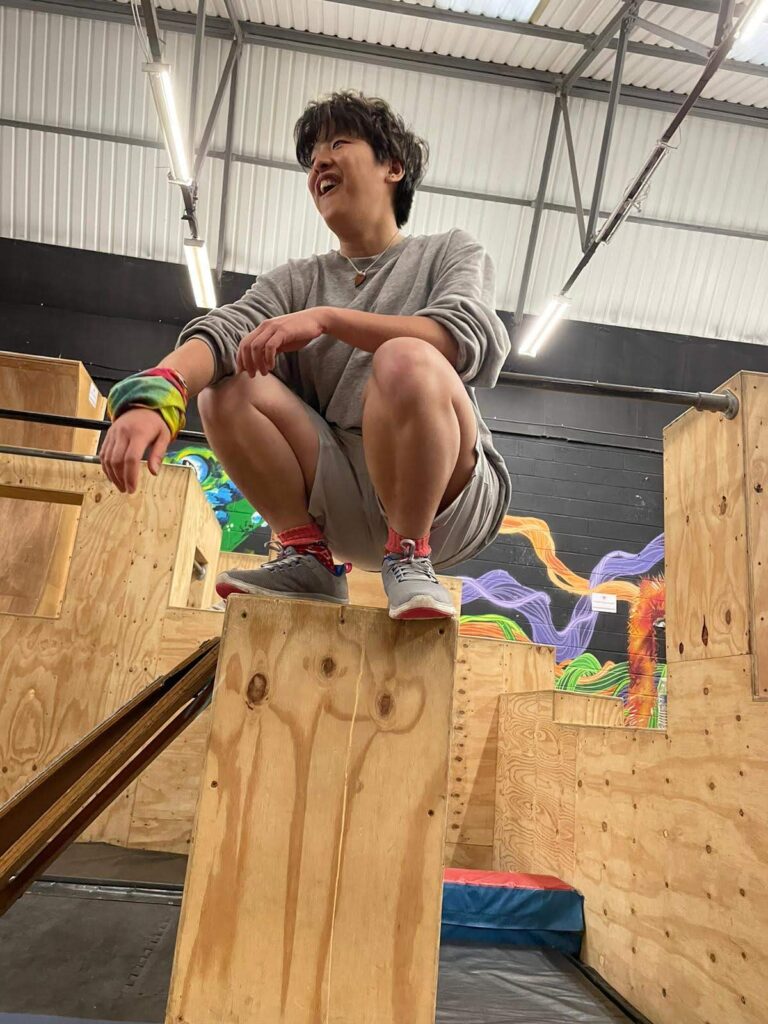
I arranged a call with the Queer Parkour group to learn a little bit more about their goals and ambitions.
The call was super insightful, I learned a lot from it, and seeing a proactive group of individuals want to make a change is super inspiring.
You can read more about Queer Parkour, and the conversation I had with them below!
Callun: What is this project, and how did the 4 of you come together to make this happen?
Louiseanne: I met Jia Wei online first actually, at Esprit Concrete’s Zoom Yamak Style Training during lockdown. Shahman from the Singapore parkour community linked us and we started chatting. We realised we both identified as part of the LGTBQIA+ community, and talked about how a lot of people in the world pronounce our names wrong, and it is indeed basics like names and pronouns that help people feel seen. So Jia Wei approached me with an idea – how about a community group that’s a centralised hub for queer people who do parkour, art du deplacement (ADD), and freerunning?
There are small chat rooms and groups on Facebook and Instagram (like ‘parqueer’ and ‘trans & nb pk pride🏳️🌈’), as social media can be a hub for people to chat, but there doesn’t seem to be a bigger hub for people to go to within our community with national policies and whatnot. So we thought, why can’t we do something about that?
We know some LGBTQIA+ people who do PK/ADD/FR around the world, and some seem ‘singular’. Why don’t we form something together to support these singular people which ultimately means the queer community? If we felt alone in our various pasts, then other queer people might feel alone too.
Jia Wei: It felt like there was a load of small, mini-groups, without substantial structure like a union. There doesn’t seem to be a unified community in which we could support each other, like the other way round to organisations recognising Pride campaigns, trans visibility days, etc. So with our Queer Parkour group, we are slowly building an agenda that creates support, for example, LGBTQIA+ awareness training and EDI policy specific to PK/ADD/FR, partnerships with LGBTQIA+ charities, etc.
Kel: It’s starting as a small community group, with the idea of expanding into regions and worldwide. I moderate the Women’s channel of Parkour Earth, and Mish (NZ) moderates the LGBTQ+ channel there. We’ve started building connections with the Australian Parkour Association and Aotearoa New Zealand, and knowing the United States Parkour Association (USPK) has already started making a change with their recent Trans Inclusion Policy for Parkour competitions (click here), we are keen to collaborate as we grow.
We want to start the hub in the UK, but we want to eventually empower communities worldwide. Parkour, Art du Deplacement, and Freerunning are all-inclusive disciplines, and nobody is alone in this. We come together, we train together, and start and finish together like how the Yamakasi founders began.
Louiseanne: We started combining our knowledge and lived experience on what hasn’t worked well so far in the Queer community for us 4, what we’ve heard from fellow friends in the community, and these motivated us to shape our values. For instance, Amy has a lot of insight in terms of the competition side of things and her experience, and we would love to translate this into an inclusion policy recognised in the UK, seeking support from governing bodies like Parkour UK and USPK. Basically putting lessons learned from our lived experience onto a legit bit of paper and making a change that way.
Callun: Am I right in thinking you have something going on with Fluidity Freerun at the moment?
Jia Wei: I run the Cardiff community group (Queer Parkour Instagram), we just started back in April, but interest has really been picking up. We’ve been collaborating with Fluidity and now we have a bespoke membership with them!
Weekly, we get about 10 people, there are regulars and there are new members. Our latest session had 5 new people come in, and there are regular inquiries coming in. Cardiff has a really proactive community, there are Queer skate communities and Queer football clubs, and now the LGBT+ Sports Network Wales has also invited us to join as well, so things are picking up in the Cardiff area.
Fluidity said that once we have enough people, we will be able to run bespoke LGBT+ sessions, and we are liaising with a traceur named Jake Hurley, who has done some outdoor sessions together with us. We always train in Fluidity, and it is nice to offer our members opportunities to train outside to utilise skills learned in the gym!
You can see the community feel in our photos on Instagram @queerparkourcardiff, all the smiling faces, some who are incredibly new to Parkour. We’re all coming together to learn a new thing. It’s a baby which came out of the four of us’ discussion, that will slowly branch out to different areas.
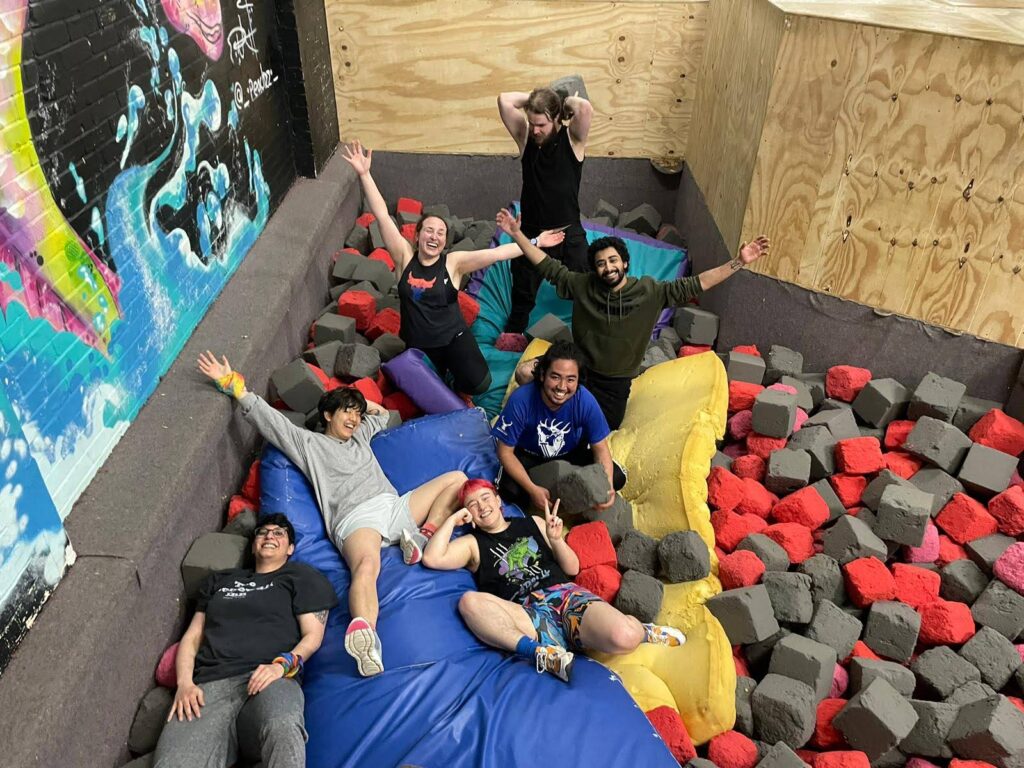
Queer Parkour Cardiff jam at Fluidity Freerun, April. Photo by Jia Wei Lee.
Callun: What Does The Membership with Fluidity Freerun Entail?
Jia Wei: I sought out opinions from the Queer community first, and then I found out that we actually had a substantial amount of people interested in starting a Queer Parkour community in Cardiff. So I started liaising with Otis Larkins, the Operations Manager of Fluidity Freerun Academy. Because a lot of our members are asylum seekers and refugees, and we’re very intersectional (trans, neurodivergent, disabled, etc.), lots really wanted to learn and try parkour – we reached out to Otis to see if we could have a bespoke parkour membership, that can give these people a chance to try parkour at an affordable rate.
Otis then curated this membership for us that includes 8 hours of either open sessions, “Funky Fridays” which is a creative movement class, and soon – bespoke LGBT+ sessions specialised for the group. You can choose to join any session you want, and it’s affordable for all members. It’s an inclusive way for those who might want to join Parkour, but it might be too expensive for them, so it allows them to come and experience parkour and find community there. It’s worked for us really well so far.
It’s early stages, but you can really see the community and the friendships growing. I live to see this, where people of kindred spirits come together, train, and strive together.
Callun: Is this something you can see other gyms adapting? As it develops, would you work with other gyms to create a similar sort of thing?
Jia Wei: That’s one of the things that Queer Parkour wants to do. As well as being a community hub, we want to have resources that are able to inform teams and gyms to help them be more inclusive. We don’t want to just be there to exist as something that just runs events once or twice a year. We want to be able to support the community to its fullest. That’s why we are taking it slow and steady, to make sure we are able to know exactly what documents we want to draft, what infrastructures already exist and what is lacking, and which organisations share similar visions so we collaborate with them and make this something that can be as sustainable and drive itself for the long run.
Amy: I want to take this to a place where it serves a purpose. An infrastructure that allows different avenues for diverse members to have a safe space, including policy routes and a hub that the community can go to when faced with discrimination. At the moment, it seems that no one is held accountable when discrimination happens at events and there is no support for either party, it sucks. I do feel like there needs to be somewhere you can go to, and that they have your back in that sense. Having small community groups isn’t enough. What happens if you’re excluded, or challenged away from these groups? Where do you go from there? It will be cool to have some involvement with that. I’d also love to branch out, like finding funding to help people afford trainers/shoes for parkour. It will enable them to participate in the sport that way.
Having an infrastructure can support many other avenues too like Parkour-related jobs, such as an athlete. What if you’re discriminated against on set? What support do you have? Having something like this in place would be great.
Louiseanne: I echo that. We want to take the time to do our field research. How many of these small communities are there, and can we chat with them? It might be a tall order but it’s essential for inclusion no? Find out what this region’s community saying, what is that community saying, etc. When things go big, they tend to go general which has pros and cons, especially when being a queer person your lived experience is so personal. We want to minimise people feeling left out, so we want to engage with individual communities.
Amy: Some things that we want to implement may not necessarily be right, and some people may not agree with it. Their input is important, as they could potentially bring something greater to this that we previously overlooked. I think it would be wrong to jump straight into it, without speaking to the people/community it affects.
Louiseanne: Yeah, speaking to the people, for the people. As much as it is about empowering people to integrate into a group, it is also about encouraging the group to provide a more inclusive environment. I vouch for the values Esprit Concrete stands for. Take their annual event (pre-covid) Les Dames du Mouvement for example. Their aim is to open up a safe space for everybody regardless of their background, experience, gender, identity, age, faith, etc, encouraging all to come together. Representation matters, true integration takes time and effort but is not impossible.
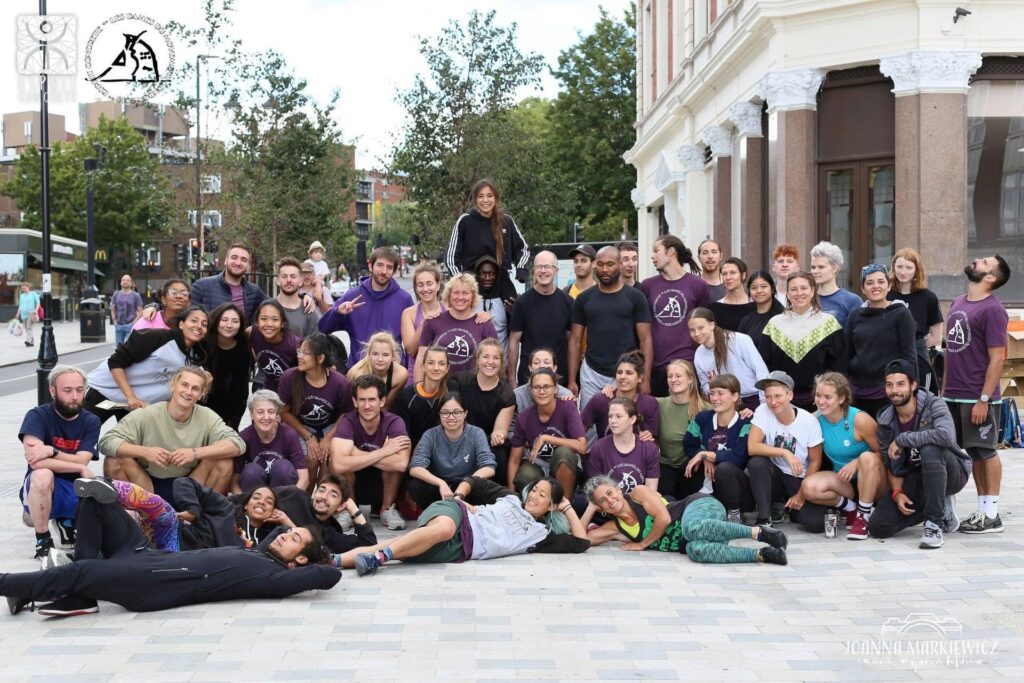
Esprit Concrete Les dames du Mouvement event 2019 photo by Joanna Markiewicz
Amy: It’s the perfect way to go. In Manchester, we have the Proud Trust. I don’t know if they branch out elsewhere, but they’re a big LGBT+ group in Manchester. I’ve always wanted to offer parkour sessions with people like that, but this is why it’s such a big thing to take it at a steady pace and not rush things for Queer Parkour. This is important, especially when it comes to the legality side of things. There’s big stuff planned, but it wouldn’t be fair to jump straight into that.
Louiseanne: Starting from finding out what’s already happening, asking people who attend jams/ events/ city takeover / structured classes / open gym sessions/competitions, like the upcoming Manchester Women’s and Enby jam run by Amy, about what they would like to see in the future, how are they currently being supported as a queer person, and what’s missing for them.
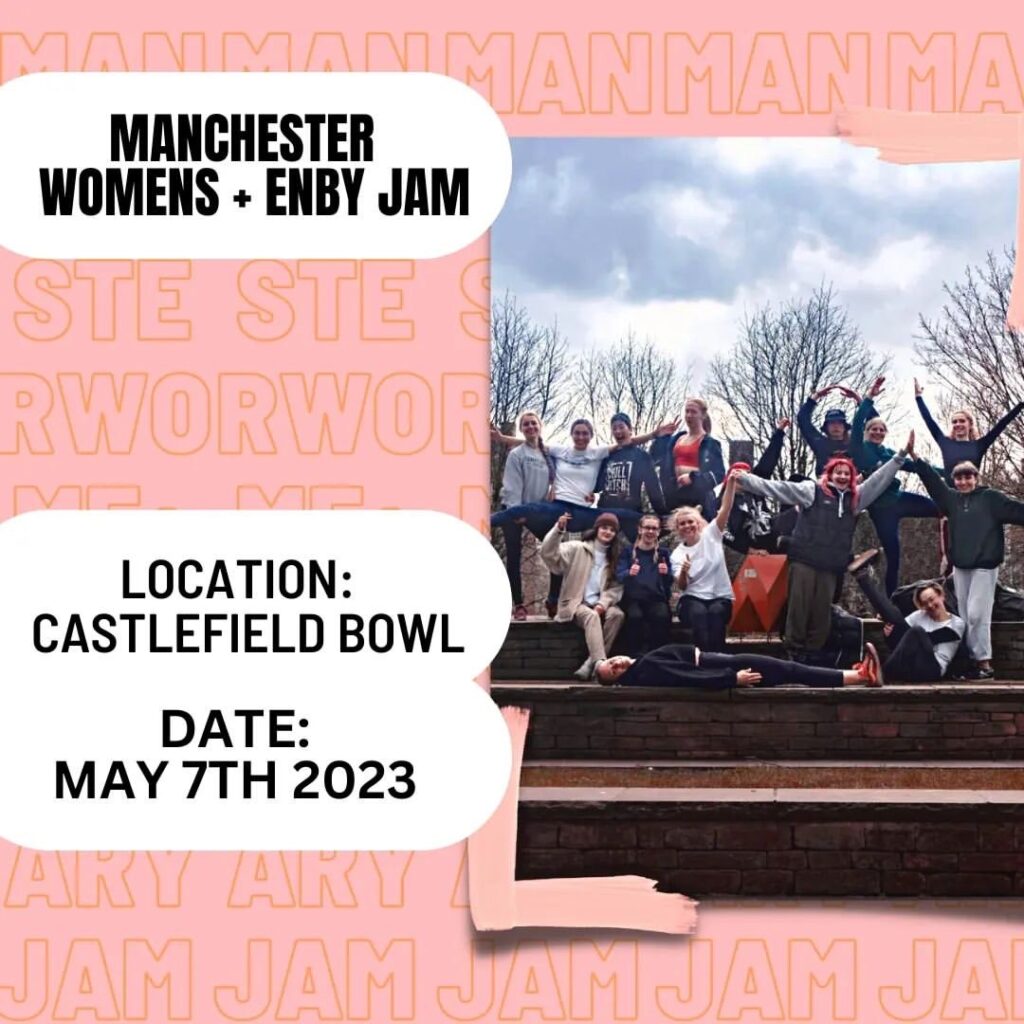
Manchester Women’s and NB Jam 2023 design by Amy Harcourt.
Following the call with the Queer Parkour group, we discussed the next steps, and what Parkour UK can do to help.
Parkour UK is working with Queer Parkour to get some information and guidance on our website with useful resources, links, and helplines for the queer parkour community. This can be expected to go live on the website soon.
If you enjoyed this article, why not share it on social media?
Fancy getting in touch with a story? You can follow and reach out to us on any of the social media links below! We would love to hear from you!
